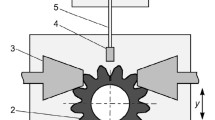Summary
External electric leads, soldered into plated-through-holes (PTHs) of a printed circuit board (PCB), provide, in addition to electrical interconnection, also mechanical support for heavy (high mass) electronic components mounted on the board. The leads can possibly break, if the PCB support contour is subjected to extensive vibrations that are being transmitted to the heavy component. In this analysis we examine the dynamic response (forced vibrations) of a heavy component to harmonic (sine) excitations applied to its external electric leads. The vibrations are due to the angular oscillations of the clamped ends of the leads. These oscillations, in their turn, are due to the vibrations of the PCB support contour in the PCB through-thickness direction. The obtained results can be used to evaluate the stresses occurring in the electric leads because of the harmonic oscillations of the PCB support contour. These results can be used also for the assessment of the "output" spectrum of the dynamic stresses, when the oscillations of the PCB support contour are random and are described by an appropriate "input" power spectrum.
Zusammenfassung
Externe elektrische Anschlüsse, die in Durchkontaktierungen einer Leiterplatte eingelötet werden, bieten – zusätzlich zur elektrischen Verschaltung – auch mechanische Unterstützung für elektronische Komponenten mit großer Masse auf der Leiterplatte. Die Anschlüsse können allerdings leicht brechen, wenn die Halterung der Leiterplatte starken Schwingungen ausgesetzt ist, die sich dann auf das schwere Bauelement übertragen. In dieser Studie untersuchen die Autoren das dynamische Verhalten eines schweren elektronischen Bauelements hinsichtlich der Einprägung von Schwingungen (sinusförmige Anregung) an den externen elektrischen Anschlüssen. Diese Schwingungen gehen von Biegungen der in der Durchkontaktierung verlöteten Enden der Anschlüsse aus. Diese wiederum sind bedingt durch die Schwingungen der Halterung der Leiterplatte in Richtung der Durchkontaktierung. Die erhaltenen Resultate können dazu verwendet werden, die mechanischen Spannungen in den Anschlüssen zu untersuchen, die aufgrund der harmonischen Schwingungen der Halterung auftreten. Diese Ergebnisse können dann zur Bewertung eines "Ausgangs-Leistungsspektrums" der mechanischen Schwingungen eingesetzt werden, wenn die Schwingungen der Halterung der Leiterplatte als zufällig angenommen werden und durch ein entsprechendes "Eingangs-Leistungsspektrum" beschrieben werden.
Similar content being viewed by others
References
Darbha, K., Ling, S., Dasgupta, A. (1997): Stress analysis of surface-mount interconnections due to vibration loading. ASME Journal of Electronic Packaging 119 (3).
La Malfa, S., Laura, P. A. A., Rossit, C. A., Alvarez, O. (2000): Use of a dynamic absorber in the case of a vibrating printed circuit board of complicated boundary shape. Journal of Sound and Vibration 230 (3).
Lim, G. H., Ong, J. H., Penny, J. E. T. (1999): Effect of edge and internal point support of a printed circuit board under vibration. ASME Journal of Electronic Packaging 121 (2).
Markstein, H. W. (1987): Designing electronics for high vibration and shock. Electronic Packaging and Production.
Markstein, H. W. (1989): Design with vibration in electronics. Electronic Packaging and Production.
Ong, J. H., Lim, G. H. (2000): A simple technique for maximizing the fundamental frequency of vibrating structures. ASME Journal of Electronic Packaging 122 (4).
Steinberg, D. S. (1983): Protection PCB's from shock. Machine Design, March 1983.
Steinberg, D. S. (1983): Vibration analysis for electronic equipment. New York: John Wiley & Sons.
Suhir, E. (1992): Nonlinear dynamic response of a flexible thin plate to constant acceleration applied to its support contour, with application to printed circuit boards used in avionics packaging. International Journal of Solids and Structures 29 (1).
Suhir, E. (1992): Response of a flexible printed circuit to periodic shock loads applied to its support contour. ASME Journal of Applied Mechanics 59 (2).
Suhir, E. (1997): Applied probability for engineers and scientists. New York: McGraw-Hill.
Suhir, E. (2000): Predicted fundamental vibration frequency of a heavy electronic component mounted on a printed circuit board. ASME Journal of Electronic Packaging 122 (1).
Suhir, E., Burke, R. (1994): Analysis and optimization of the dynamic response of a rectangular plate to a shock load acting on its support contour, with application to portable electronic products. IEEE Transactions on Components, Packaging, and Manufacturing Technology, Part B 17 (3).
Suhir, E., Lee, Y. C. (1990): Thermal, mechanical and environmental durability design methodologies in electronic packaging. In: Handbook of electronic materials. ASM International.
Timoshenko, S. P., Young, D. H. (1955): Vibration problems in engineering, 3rd ed. New York: Van-Nostrand.
Wong, T.-L., Stevens, K. K., Wang, G. (1999): Experimental mode analysis and dynamics response prediction of PC boards with surface mounted electronic components. ASME Journal of Electronic Packaging 121 (2).
Author information
Authors and Affiliations
Rights and permissions
About this article
Cite this article
Suhir, E. Response of a heavy electronic component to harmonic excitations applied to its external electric leads. Elektrotech. Inftech. 124, 309–314 (2007). https://doi.org/10.1007/s00502-007-0458-z
Received:
Accepted:
Issue Date:
DOI: https://doi.org/10.1007/s00502-007-0458-z
Keywords
- External electric leads
- Heavy electronic components
- Forced vibrations
- Dynamic stress
- Oscillations
- Response function




